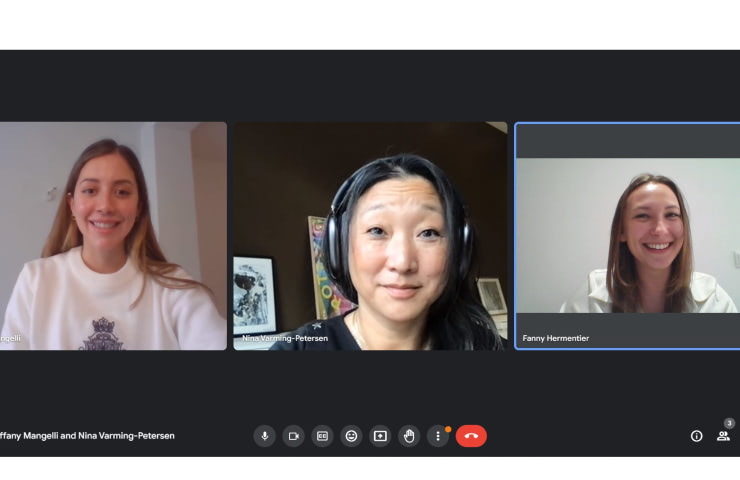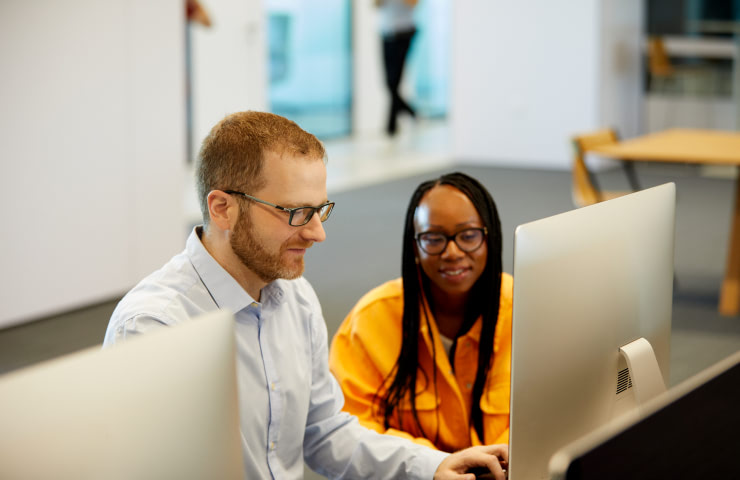23/02/2024
At IE School of Science and Technology, our aim is to empower our students to unleash their potential in today’s fast-paced world. As the tech industry continues to grow, so do our female leaders. The Tech Mentorship Program creates a mentor/mentee relationship with current students and leading women in the industry. We recently sat down with women in the program to learn how it is affecting their personal and professional lives.
The Tech Mentorship Program, designed by IE School of Science and Technology, gives current graduate students the opportunity to work with a mentor who helps them find their personal path within the market. The program is focused on personal growth for both parties and works to break down silos and remove fear of entering a male-dominated sector.
Mentors Elena Maran and Nina Varming-Petersen, and mentee Fanny Hermentier, shared their experiences in the program.

Why did you want to become a mentor?
Elena: When I was a student, the faculty and staff at IE University played a big role in helping me transition to the tech sector and become a business developer in AI strategies. They helped me hone in on my strengths and gave me a lot of advice throughout my program and beyond. I wouldn’t be where I am today without this help, and I wanted to give back to IE University by helping guide the future.
Nina: I’ve been a mentor for 10 years, mostly with CTOs and software developers. When I learned about the initiative from Ikhlaq to help the next generations of business leaders, I felt motivated and also wanted to give back from my time at UC Berkeley. My purpose is to support them in their learning path and their growth.
What does it mean to be a mentor/mentee?
Elena: As a mentor, I’m able to guide young talent toward believing that they can succeed in the world. It’s about inspiring someone to undertake a path similar to the one I went on. I want to help my mentee capitalize on the program and the experience in order to make it something tangible in their career. I hope to create a layer of confidence in my mentee and push her to take her learning to the fullest.
Nina: My role is to figure out what my mentee is hoping to pursue and why—and then guide them in building confidence in decision-making. I work with learning roadmaps so that my mentee builds a foundation for growth by combining problem-solution approaches with feedback loops.
Fanny: I didn’t really know why I needed a mentor until I met Nina. It was an opportunity to see the world of work through someone else’s point of view, challenges and success stories included. It’s a learning curve; I got to learn so much about small mistakes to avoid, as well as paths I could take. A mentorship is really focused on you.

It’s a chance to walk in the shoes of an IE University alum who understands the struggle of carving out a path to achieve a specific goal.
Is there a special background required to be a mentor?
Nina: You have to be willing to utilize your experience on the premise of the mentee. If you have extensive expertise in one area, you have to figure out how that can help guide your mentee in a direction best suited for them. The ability to adapt to your mentee’s problems is important because you have to remember that it’s not about you.
What does it mean to be working with other women in the tech sector?
Elena: I think this program is really beneficial for women because women can be afraid to start a career in technology; they believe it’s not for them. It’s important to speak to women in the sector in order to enter the market confidently. They see that if another woman can do it and be successful, so can they.
Nina: One thing that has been particularly rewarding has been discussing power dynamics with my mentees. They still exist, and you have to know your own strengths in order to carve out your own path rather than just going with the traditional flow. This is true for anyone, but I think for women in tech it particularly resonates, and I’m happy to help with that.
Do you believe this experience has enriched you both personally and professionally?
Elena: Absolutely. For me, it’s been very touching to see my mentee be courageous enough to pursue her dreams and follow what she wants to do. She wasn’t sure she could get where she wanted, but I was able to show her new opportunities, and she got a job before finishing the program. Nothing could be more rewarding than seeing her fulfill her dreams.
Nina: Our discussions gave me a burst of energy, and I also learned something new. Fanny pushes me to think about how she arrived at a solution, and then I work backward in order to figure out how she got there in order to create the right questions for future learnings.
I have opened my network for my mentees, and it’s rewarding to support their progression there as well.

Fanny: I’m going to use one word to describe my experience, even though it sounds cliché—transcending. When I started the program, I told Nina I could go back to my old company and take the safe option. But after our second or third meeting, I was working on a pitch deck for a new company without her even suggesting it. Having Nina as a mentor taught me to ask myself questions I would have never even thought of. Sometimes it just takes that extra push.
How can you become a successful mentor/mentee?
Elena: Listen to your mentees. Listen to their goals and to what they want to achieve. Don’t just talk about yourself and how you got to where you are, but try to understand how your experience can be relevant to their journey. Be empathetic and passionate and try to create a personal bond.
Nina: By getting your mentees to a place where they don’t need you anymore. Help lift them up and ask the right questions so that they learn how to arrive at decisions that are right for them and go on a journey of self-discovery. Before becoming a mentor, ask yourself why you want to be one and what you want to learn from it. If you go into being a mentor thinking you’re done learning, you risk misguiding them and making it all about yourself. Take your role seriously because it’s hugely impactful.
Fanny: Choose your mentor well. A lot of the experience depends on your connection with your mentor, so make sure that you are able to work well together and that the relationship can be mutually beneficial.
Elena’s, Nina’s and Fanny’s stories are just a few examples of the transformative and nurturing relationships already formed through the Tech Mentorship Program. Our international group of mentors, all with varied backgrounds and experience, ensures that mentees are paired with someone who can best guide them on their individual journey to personal and professional success. And as these stories prove, the program is helping to reduce gender gaps in the industry, supporting women to build a successful and impactful career in the tech world.








